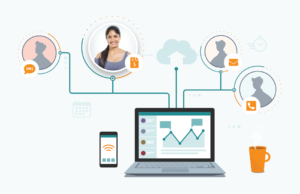Revenue cycle management (RCM) companies are under growing pressure to reduce costs, improve operational efficiency, and deliver a better patient experience. Patient self-service solutions address these challenges by empowering patients to manage their billing and payments independently, streamlining workflows, and driving revenue growth.
What Is Patient Self-Service?
Patient self-service refers to tools that enable patients to handle billing-related tasks—such as making payments, setting up payment plans, and resolving issues—without needing direct assistance from billing staff. These solutions integrate seamlessly with practice management systems, reducing manual effort and improving overall efficiency.
By incorporating tools like interactive digital bills, chat, and IVR, RCM companies can empower patients with self-service solutions that reduce operational overhead.
How Patient Self-Service Reduces Costs
- Lower Call Volume: IVR and chat handle routine inquiries, freeing staff for complex issues.
- Streamlined Payments: Automation reduces manual entry and reconciliation.
- Improved Cash Flow: Faster payments reduce collection time and effort.
- Fewer Paper Statements: Digital bills cut printing and mailing costs.
Interactive Digital Bills
Interactive digital bills are modern, user-friendly tools that help patients manage their healthcare payments online. Unlike traditional paper statements, these digital bills present detailed breakdowns of charges and enable immediate actions, such as making payments, setting up plans, or saving cards on file. Their benefits include:
- Enhanced Transparency: Clearly displays itemized charges, reducing confusion and inquiries.
- Convenience: Allows patients to quickly resolve balances independently.
- Streamlined Processes: Accelerates payment collection and reduces administrative burdens.
- Improved Satisfaction: Offers a seamless, accessible billing experience, building patient trust and loyalty.
Live and Automated Chat
Chat solutions, including live chat and chatbots, are digital tools that enable patients to submit inquiries or manage billing issues directly via websites or apps. These tools provide real-time assistance, allowing patients to resolve issues without contacting a call center or billing team. Chat solutions offer several key benefits:
- Immediate Responses: Patients receive quick answers, reducing frustration and enhancing satisfaction.
- Automated Support: Chatbots handle common inquiries without human intervention, cutting call volumes.
- Scalable Interaction: Manage multiple patient inquiries simultaneously, minimizing wait times and maintaining service quality.
- Operational Efficiency: Frees staff to focus on more complex or urgent tasks.
Interactive Voice Response (IVR)
Interactive Voice Response (IVR) is a phone-based technology that enables patients to interact with automated systems using voice commands or keypad inputs. In revenue cycle management (RCM), IVR allows patients to make payments without speaking to a human agent. This automation offers several benefits:
- 24/7 Availability: Patients can make payments outside business hours.
- Reduced Workload: Automates repetitive payment calls, freeing billing staff to focus on complex inquiries or high-value activities.
- Scalability: Handles large call volumes simultaneously, accommodating spikes in demand effortlessly.
- Improved Patient Experience: Reduces wait times and provides quick, reliable, and secure payment processing over the phone.
What This Means for You
Patient self-service is about more than cost savings—it transforms the patient experience and boosts efficiency for RCM companies. By adopting self-service tools, RCMs can deliver convenience, transparency, and patient satisfaction while driving operational gains and revenue growth. Embracing these solutions is essential for staying competitive in an evolving healthcare landscape.



